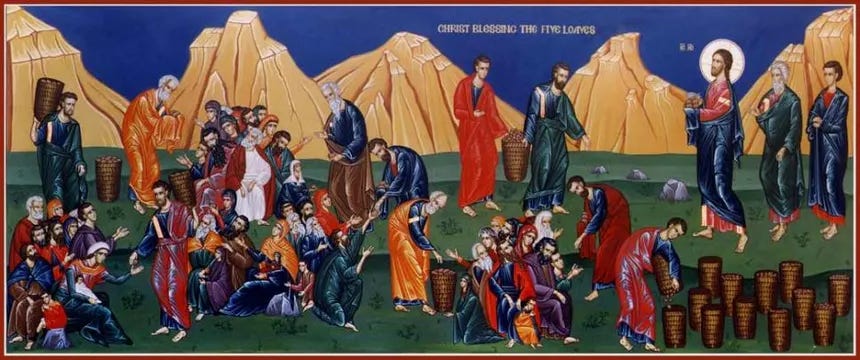Following Christ, Not Influencers
Homily for the 8th Sunday after Pentecost | 1 Cor 1:10–18 • Mt 14:14–22
Today’s readings remind us that God has a perfect plan for your life. He created you. Only He can truly nourish you and care for your every need—body and soul. And in return, we owe Him our whole life—our gratitude, our trust, our fidelity, and our cooperation with His divine plan. But the reality is, many people today are living outside of that plan. They are living outside the state of grace. The world tells you to follow your feelings, chase your desires, and create your own truth. But Scripture calls us back—to once again make Christ the sole center of our life.
St. Paul, in his letter to the Corinthians, expresses frustration. The community is divided. Some are saying, “I follow Paul,” others, “I follow Apollos,” or “Cephas,” or even, “I follow Christ.” In other words, they’ve started to confuse the messengers with the message of the Gospel. We see the same thing today. Some people rally around Catholic personalities or influencers—this writer, that apparition, this pope, that devotion. But the question is not, “Whose camp are you in?” The only question that matters is: Are you following Christ in the Church? As St. Paul says elsewhere, “Imitate me in so far as I imitate Christ.”
The Gospel brings this into focus through the feeding of the five thousand. The context is important: John the Baptist has just been beheaded. The Fathers explain that Jesus retreats to the wilderness not out of fear, but to avoid provoking a second murder before His appointed hour. His Pascha had not yet come. There was still work to do—healing, teaching, and preparing His disciples. When the crowd follows Him, Jesus has compassion. He heals their bodies, and—as St. Hilary teaches—He also heals their obstructed minds and unbelieving hearts, preparing them to receive the truth. Then He feeds them with bread and fish. And the way St. Matthew describes this miracle is fitting. Jesus takes, blesses, breaks, and gives—the same language used at the Last Supper and in the Divine Liturgy.
And then, He tells the Apostles, “You give them something to eat.” And in so doing, He is planting the seed of their future ministry. They don’t understand it yet. They prefer to send the crowd away. But Christ is forming them—preparing them to feed His Church with the Word of God and the Bread of Heaven. The five thousand represent the members of the Church who respond to the invitation and follow Christ into the wilderness to be fed by Him. As He says elsewhere: “I am the bread of life… unless you eat My flesh and drink My blood, you have no life in you.” He created us. He sustains us. He prepares a table for us—even in the wilderness.
The question is, am I following the Father’s plan for my life—or am I following my own program? Christ is inviting us into eternal communion with Himself—a communion that requires daily surrender, daily cooperation. This communion of love is fullness of life!
It is fitting that this Gospel passage ends with Jesus sending away the crowds. Those who had tasted the goodness of the Lord did not want to leave—and understandably so. But Christ teaches us that it is good both to be together—and to be alone. He models the importance of retreating into silence, to be with the Father. We encounter Jesus in the Liturgy, in Agape, and in community. But we also encounter Him in the interior stillness of the heart. It is there—in silence and solitude—that we learn to invite God into every hour, every task, every joy, and every sorrow. He comes in sacrament and sacramental. In Divine Liturgy and in daily duty. That is how He nourishes and sustains us: when we allow Him to reign perpetually in our hearts—as Father provider, loving Savior, and benevolent King. Amen.




Thank you for the helpful message. I'm sharing it w my family.